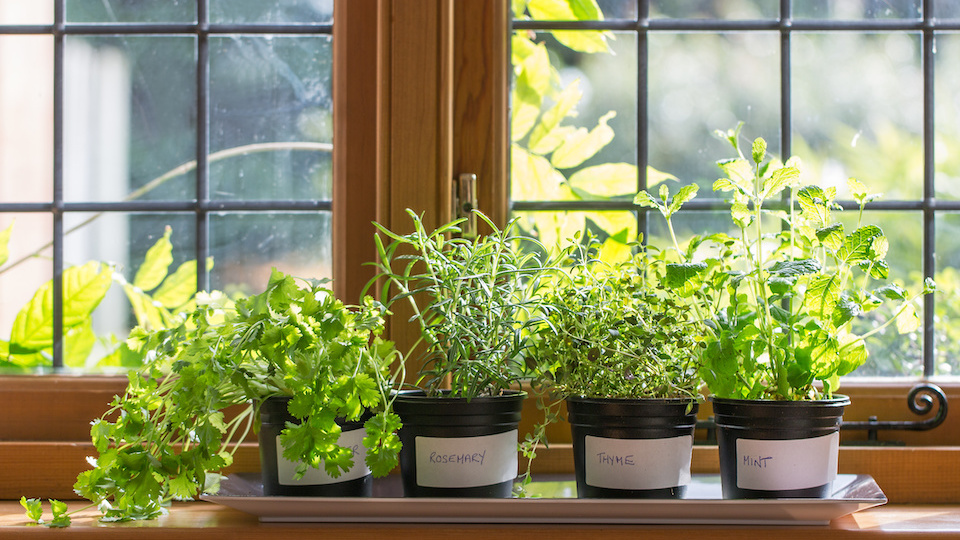While indoor plants for decor are undoubtedly beautiful, there’s something to be said for plants that are pretty and functional. If you love to cook, want easy access to fragrant herbs for drying or tea making, or simply have an empty kitchen windowsill that you want to fill, consider planting an indoor herb garden. Don’t worry, it’s not as hard as you think, and if you follow these simple tricks, you’ll be able to enjoy fresh, free herbs all year long.
Choose herbs you’ll use
Even if you have space for all manner of exotic and rare herbs, it’s unlikely that you’ll use them enough to warrant growing them in your home. When you are first getting your herb garden up and running, stick to common herbs that you’ll actually use, such as basil, mint, and rosemary. You can always expand later, but it is still important to consider practicality.
Light is key
The most important thing that you need to consider is the light situation in your home. Do you have a large, southern-facing window with a lot of empty space for a collection of pots, or do you have a small, shady apartment that rarely sees the sun? If the latter is more accurate, you may want to invest in a grow light that will give your herbs the artificial sun they need to thrive. Otherwise, place your plants in an area where they can receive direct sunlight for most of the day.
Don’t forget drainage
Herbs hate sitting in water and will quickly wilt and die if overwatered. Make sure that your pots have a few drainage holes and always place a tray below the pot to catch any excess water. Otherwise, your windowsill or tabletop could suffer water damage. Glazed or plastic containers work best for holding in the right amount of moisture, especially in the winter, when clay pots tend to dry out too quickly.
Consider hydroponics
With a hydroponic system, your herbs can grow without the mess and hassle of soil. This type of system allows the proper moisture and nutrients to be delivered directly to the plant’s roots in a soilless, waterbased growing medium. Many herbs thrive in this carefully controlled environment, so this is an excellent idea if you’ve had struggles with your indoor herb gardens in the past.
Choose adequate soil
Plant your herbs in a light, well-draining soil that is specifically geared towards these fragrant plants. Be sure to fertilize regularly to help provide nutrients for your herbs to flourish. Keep your herbs in separate pots so that you can adjust soil, light, temperature, and water requirements as needed and prevent certain herbs, such as mint, from becoming invasive and taking over whatever is in the same container.
Harvest frequently
Though it may seem counter-intuitive, the best way to ensure healthy, lush herbs is to harvest them regularly to make room for new growth. Keep a pair of scissors nearby and trim your herbs whenever you notice them starting to get a little leggy. Never harvest more than a quarter of the plant at a time, but focus on small, frequent harvests. Experiment with different dishes and flavor combinations, and don’t be afraid to make a recipe your own with the addition of some freshly harvested herbs.
Move pots outdoors
Once the weather warms up, feel free to move your containers to your patio or balcony. Many herbs will appreciate the fresh air and increased sunshine and will be healthier when you bring them inside in the fall. Remember, keep them close by so that you can continue to harvest with ease.
Start with plants
Though you can grow herbs from seed, the process is al little tricky and can often be discouraging for amateur gardeners. Start with established clippings from friends or your local garden center. This will give you a hardy plant to work with and will significantly increase your chances of success.
Best herbs to grow indoors:
- Basil
- Chives
- Lemon Balm
- Marjoram
- Bay
- Mint (Chocolate Mint, Peppermint, Spearmint, or Sweet Mint)
- Oregano (Greek Oregano, Italian Oregano, or Hot & Spicy Oregano)
- Parsley (Flat Italian Parsley or Curled Parsley)
- Rosemary
- Sage
- Thyme (German Thyme or Lemon Thyme)
What are your favorite herbs to grow indoors? How do you utilize your indoor herb garden? Let us know in the comments below!
-Taylor Ramsey




